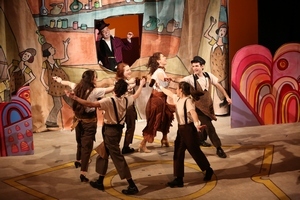SITE GUIDE
SEARCH
REVIEWS
REVIEW ARCHIVES
ADVERTISING AT CURTAINUP
FEATURES
NEWS
Etcetera and
Short Term Listings
LISTINGS
Broadway
Off-Broadway
NYC Restaurants
BOOKS and CDs
OTHER PLACES
Berkshires
London
California
New Jersey
DC
Philadelphia
Elsewhere
QUOTES
TKTS
PLAYWRIGHTS' ALBUMS
LETTERS TO EDITOR
FILM
LINKS
MISCELLANEOUS
Free Updates
Masthead
A CurtainUp Review
The Megile of Itzik Manger
| "And G-d willing, I will give my niece a few words of warning. And Esther, long may she live, will prevail upon the king, "Mordkhe
|

|
|
Cast Members making merry
|
As The Megile of Itzik Manger chronicles, the deliverance was achieved through the wisdom of the hero, Mordecai (Mordkhe) and the loyalty of his niece, Esther, who marries the king (after his first wife, Vashti, refuses to come when called) and gets the king to change his mind. The story is told in the biblical Book of Esther, known as the Megile. The Purim spiel also tells this story, but in a more comic dramatization. This show, produced by The National Yiddish Theatre/ Folksbiene, follows the latter tradition.
While my children were growing up, I wrote many Purim spiels in which the entire family performed. The songs and themes I integrated into the spiels reflected American culture and more particularly, American musical theater. And so I was pleased to learn in the delightful Yiddish and Purim spiel lesson given by director Motl Didner 45 minutes before every performance of The Megile of Itzik Manger, except the Sunday matinee, that the spiel from its very beginning reflected the culture surrounding the Jewish community.
The Purim spiel was born in renaissance Italy. As the holiday arrives at the end of February or the beginning of March, it coincides with the beginning of Lent or the Mardi Gras. Thus Purim festivities have many of the trappings of the gentile holiday as it was celebrated at that time: parades, puppets, masks, clowns and all sorts of revelries.
All of these elements are outstanding in Folksbiene's production of The Megile of Itzik Manger, which is based on the landmark production that starred the Burstein family, featured sets and costumes by the circus innovator Jenny Romaine and used the poetry of Yiddish poet Itzik Manger. The cast of twelve is led by Tony nominee Stephen Mo Hanan, who plays the clownish King Akheshveyresh.
In this retelling, the story has been changed considerably. The king doesn't just ask that Vashti (Rebecca Keren) appear before him; he demands that she parade naked in front of his ministers, which she refuses to do ("Vashti's Song of Protest"). Although Esther (Stacey Harris) agrees to marry the king, she is really in love with a handsome, young tailor named Fastrigrosse (Andrew Keltz). And Esther is not quite as faithful as a good Jewish wife might be ("The Song of the Golden Peacock"). Both Harris and Keren are vocal powerhouses.
Didner made the clever choice to cast Jonathan Brody as both Homen and his foil, Mordkhe. This only adds the the exuberant foolishness of the show.
The retelling of the Purim story is accompanied by dance, juggling, acrobatics and song. Young men play young ladies to great comic effect. The king wears a clown's nose. Mordkhe has a ridiculously long and ample beard. Joyful klezmer music never lets the pace slacken.
The Megile of Itzik Manager has arrived onstage two months after Purim. The megile has been read, the noisemakers and costumes put away for next year. But when a show is as much fun as this, even without a holiday, it's cause for celebration.
|
The Megile of Itzik Manger Book & Lyrics by Samuel Bunim, Haim Hefer, Itzik Manger, Dov Seltzer Music By Dov Seltzer Directed by Motl Didner Music Direction: Zalmen Mlotek Cast: Stephen Mo Hanan (King Akheshveyresh/Fanfosse, Shane Baker (Loyfer), Jonathan Brody (Mordkhe/Homen, Stacey Harris (Esther), Andrew Keltz (Fastrigosse), Rebecca Keren (Vashti), Stav Meishar (Zeyresh), Stav Meishar (Zeyresh), Jeremy Rishe (Vayzose) Fastrigosse's Mame (Hannah D. Scott) Choreography: Merete Muenter Production Design: Jenny Romaine Lighting Design: Natalie Robin Sound Design: Benjamin Furiga Spectacle Engineer: Daniel Rosza Lang/Levitsky Costume Engineer: Kelly Horrigan Production Stage Manager: Alex Brouwer Running Time: 90 minutes, no intermission Baruch Performing Arts Center, 55 Lexington Ave. From 4/21/13; opening 4/25/13, closing 5/12/13 Wednesday & Thursday at 2pm and 7:30pm, Saturday at 9:30pm, Sunday at 2pm and 6pm Tickets: $65 866/811-4111 or nationalyiddishtheatre.org Reviewed by Paulanne Simmons April 28, 2013 |
| REVIEW FEEDBACK Highlight one of the responses below and click "copy" or"CTRL+C"
Paste the highlighted text into the subject line (CTRL+ V): Feel free to add detailed comments in the body of the email. . .also the names and emails of any friends to whom you'd like us to forward a copy of this review. Visit Curtainup's Blog Annex For a feed to reviews and features as they are posted add http://curtainupnewlinks.blogspot.com to your reader Curtainup at Facebook . . . Curtainup at Twitter Subscribe to our FREE email updates: E-mail: esommer@curtainup.comesommer@curtainup.com put SUBSCRIBE CURTAINUP EMAIL UPDATE in the subject line and your full name and email address in the body of the message. If you can spare a minute, tell us how you came to CurtainUp and from what part of the country. |



 Anything Goes Cast Recording
Anything Goes Cast Recording Book of Mormon -CD
Book of Mormon -CD